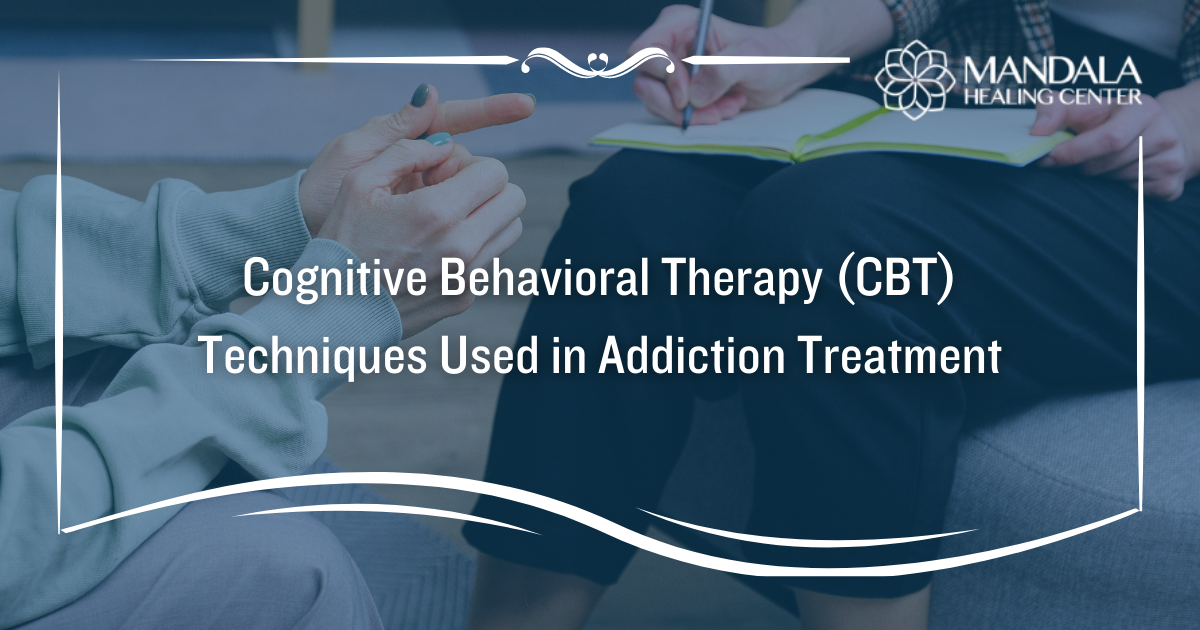Struggling with a substance use disorder can be overwhelming and exhausting. You might begin to feel like there is no hope for recovery. Thankfully, addiction treatment programs can help you gain the tools and support you need to successfully overcome drug or alcohol addiction.
According to the National Institute of Drug Abuse, 10% of U.S. adults have suffered from a drug use disorder at some point in their lives and 75% of them never receive the help they need.[1]
While going to rehab can be scary, these addiction treatment centers can provide you with the emotional support, knowledge, and recovery tools you need to maintain long-term sobriety. Some of the most effective techniques recovery programs use stem from cognitive behavioral therapy (CBT), a type of behavioral therapy that aids in the recovery from substance use disorders and other mental health conditions.
The CBT techniques you learn during rehab can stay with you for the rest of your life if you choose to implement them. Learn about common CBT techniques or speak with an admissions counselor today to learn about our treatment programs.
What is Cognitive Behavioral Therapy (CBT)?
Most people who suffer from substance use disorders suffer from underlying problems that cause them to experience negative thoughts and behavioral patterns. These manifest in the way that they adapt in life, leading to the development of their substance use disorder. Cognitive behavioral therapy is intended to address these underlying problems to help you recover psychologically and abstain from substance abuse.
According to the American Psychological Association (APA), CBT involves the following strategies:[2]
- Learning to recognize one’s distortions in thinking that are creating problems, and then reevaluate them in light of reality.
- Gaining a better understanding of the behavior and motivation of others.
- Using problem-solving skills to cope with difficult situations.
- Learning to develop a greater sense of confidence in one’s own abilities.
During cognitive behavioral therapy, several techniques are used to help identify, address, and learn to avoid harmful thoughts and behavioral patterns. Addiction treatment programs use these techniques to help people identify triggers, work through them, and avoid relapse.
Cognitive Behavioral Therapy (CBT) Techniques Used During Addiction Treatment
Cognitive behavioral therapy involves several interactive techniques that are extremely useful in the recovery from substance use disorders.
CBT techniques that are commonly used during addiction treatment include:
Journaling
Journaling, or thought records, involves an individual keeping a diary of the negative thoughts they experience. Journaling helps you see a pattern in your thoughts and look at them objectively. Instead of allowing these thoughts to become fact, you can see them through a clear and more rational lens.
Analyzing Core Beliefs
Everyone has core beliefs, but when you suffer from addiction, these beliefs may be skewed by past negative experiences. During cognitive behavioral therapy, you are asked to identify these core beliefs and then analyze them to determine whether they are based on truth.
Someone with an addiction may have the following core beliefs:
- I don’t have what it takes to get sober
- Life is boring without drugs or alcohol
- Other people do not change, so there is no point in trying
- I am a victim of my circumstances
- I do not deserve to be forgiven for my past
This CBT technique can help you change any negative core beliefs you have, allowing you to create positive thoughts that can challenge the negative behavioral patterns you developed during addiction.
Behavioral Experiments
One of the techniques used in cognitive behavioral therapy is known as behavioral experiments. It works by comparing and contrasting negative thoughts against positive ones to effect positive behavioral changes.
While some people respond better to positive reinforcements, others work better under self-criticism. The purpose of behavioral experiments is to determine whether you will respond better to self-kindness or criticism, helping you determine what works best for you in your own recovery.
Pleasant Active Schedule
You may be encouraged to create a schedule of healthy activities you can engage in that induce positive feelings. For example, your schedule can include exercising, swimming, going on a hike, watching your favorite movies, or hanging out with your loved ones. Keeping your mind and body healthy will help you experience fewer negative thoughts, reducing your cravings and urges to abuse substances.
Urge Surfing
When you suffer from addiction, you experience urges or cravings to abuse substances. Drug and alcohol cravings stem from external or internal factors that cause you to experience negative emotions. Urge surfing involves identifying the circumstances that led to your cravings and learning how to ride your urges like a wave, allowing them to come and go without reaching for drugs or alcohol.
Start Cognitive Behavioral Therapy (CBT) and Addiction Treatment Today
At Mandala Healing Center, Our clinicians develop close relationships with patients to build trust and expose the root causes of their addiction. Our highly trained treatment team has expertise in the fields of alcoholism, drug addiction, and co-occurring disorders including depression, anxiety, and bipolar disorder. Using cognitive behavioral therapy (CBT) and other behavioral therapy techniques, we can help you get rid of addictive behaviors and establish a healthy lifestyle.
Don’t wait any longer for the help you need. Call today to get started.
References:
- https://www.nih.gov/news-events/news-releases/10-percent-us-adults-have-drug-use-disorder-some-point-their-lives
- https://www.apa.org/ptsd-guideline/patients-and-families/cognitive-behavioral












